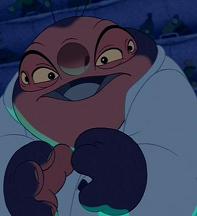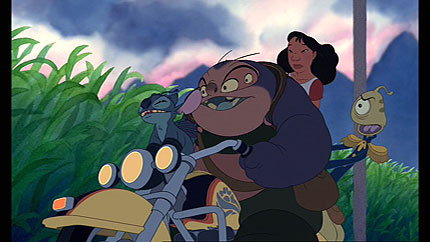|

Jumba is a wild man. Despite the stereotypical personality expected in a scientist, as a quiet intellectual, he is a huge
lumbering character who enjoys being outgoing, strong, and determined. He has no respect for the rules placed upon him, evidenced
immediately by his illegal creation of Stitch. His way of dealing with the issue of Stitch is a direct confrontation, ignoring
any semblance of secrecy or diplomacy, and revels in the moment he is fired by the council, thereby allowing him to accomplish
his goals unrestrained by their rules. Furthermore, Jumba possesses no family values. He created Stitch, but takes no responsibility
to care for him or train him against his destructive tendencies. In fact, Jumba actively enjoys Stitch's aggression.
The fact that Jumba ultimately becomes one of the heroes of the film is not exactly surprising, though it is uncharacteristic
of his established attitudes. No longer interested in capturing Stitch, or in promoting destruction, Jumba joins Stitch in
an attempt to rescue Lilo. This reveals the final rounding out of Jumba's character. He is entirely devoted to experience
and enjoyment of life. He rebels against the rules only so that he may partake in adventures beyond what are available to
him. His personality is huge, and he lives with a passion for whatever new possibilities come his way. He is a hero, not in
his adherence to moral standards, but rather in his rejection of them in order to accomplish goals. Disney uses him to give
us an extremely grey area of morality, especially in contrast with Pleakley.
Return<-
|
 |
|
|
|
 |
 |
|

Pleakley is NOT a wild man. He is nervous, na´ve, intellectual, and spends most of his time complaining about his situation,
such as his troubles with earth's wildlife. This, like Jumba, is the reverse of what one would expect from his career stereotype.
Pleakley is a government agent, apparently with a great deal of knowledge of remote locations, such as earth. However, he
is slight, wimpish, and totally unsuited to field work. He adheres to the rules of his government, and is terrified at the
idea of breaking them, or having to admit failure to his superiors, e.g. the Grand Council Woman. Pleakley dislikes doing
anything spontaneously or illegally, and complains about it sarcastically to Jumba when they steal a motorcycle. Also, Pleakley
is the very opposite of Jumba in regards to his family. Where Jumba is an ineffectual father, Pleakley is a devoted son, calling
his mother while on his mission.
Pleakley and Jumba represent two distinctly different personalities, each valuing completely different things. Yet both
spend the entire film on the same side, switching together from the pursuit of Stitch, to the aid of Stitch. With the established
moral compass presented in the first third of the film, with normal society, adherence to rules, and reason on the good side,
and aggression, disobedience, and oddity on the evil side, it seems very strange that these two characters, each holding to
his own end of the compass, are always allied. They argue about methods, but their goals are the same. This, more than most
areas of the film, to me suggests the greying of morality. Two sides both work together towards a common goal, regardless
of actual personal philosophy. Disney is not only preaching tolerance here, but is also suggesting the peaceful realization
of mutual objectives. This message can be directed towards many areas, including politics, society, and religious organizations.
|
 |
|
 |
 |
|
|
|
|



